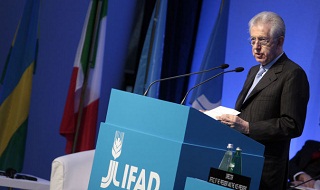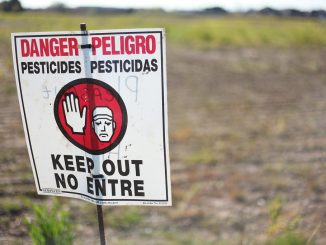
At a meeting of the Governing Council of International Fund for Agricultural Development (IFAD) on 22nd February 2012, Italian Prime Minister Mario Monti voiced his concerns on the food crisis.
The Prime Minister told the audience “In recent years much attention has been given to solving the financial meltdown, but there is an emergency that is wider and deeper – that of energy and food security”. He added “We are putting unsustainable pressure on natural resources while the problem of hunger continues to exist: such a world is unjust and hence unstable“.
According to Monti, the fact that the food security crisis requires greater efforts than those to address the financial emergency is demonstrated by the difficult situation in the Horn of Africa as well as the Arab Spring, which were caused by a sudden rise in food prices.
Food security must be put at the top of political agenda due to its humanitarian, security and stability implications. In this direction, Monti guaranteed full support from Italy, calling for “a wide-ranging approach” made up of “transversal policies between countries and institutions: we must work in a new and different way, with the collaboration of governments, international institutions and private bodies“. To do this, “we need strong institutions”. “Italy has done its part, with an increase of 10% in IFAD’s resources in spite of our serious budgetary constraints: this is the sign of willingness to continue to strongly support the IFAD’s mandate“.
Monti stressed the importance of agriculture in Italy and a national consciousness on food security. The Prime Minister said that he was proud to host the UN Food Programmes and that he was “proud to be a part of the European Union where inspiration and a recipe for global governance were born thanks to Jean Monnet’s intuition who, more than 60 years ago, developed the concept about which, in institution-building, we must proceed on two parallel paths to govern integration phenomena, i.e. the current globalisation“. The first path is the dismantling of obstacles to market integration, “which the EU has done before many others and still continues to do“. The second one “is the development of coordination and, sometimes, a true convergence of public policies between different countries“.
Reactions
His speech was greeted with a standing ovation by participants to the IFAD meeting and with satisfaction from Italian farmers.
According to CIA (Italian Farmers’ Confederation), more agriculture is needed to feed the world. “Monti does well in emphasising the fundamental importance of primary sector. To combat poverty and to avoid new global food crisis, it is necessary to move in two directions: applying common rules to stabilise food prices and develop policies to increase agricultural productivity in the Southern countries of the world”.
According to President of Confagricoltura (an Italian agricultural confederation), Mario Guidi, “The statements give rationale to policies based on increased production and interventions on price volatility that we have supported for years. Acknowledging that food and energy crisis is wider and deeper than the economic and financial one recognises the need for European and national measures that promote the revival of agriculture“.
According to President of Copagri (Confederation of Agricultural Producers), Franco Verrascina, the hope now is that we will pass from words to consequent interventions for Italian agriculture. “For example, it is necessary to intervene on IMU (Unique Municipal Tax) in such a way that capital goods, which are not only aimed at increasing rents, are not being taxed; there is also the need to assure sustainability, firstly intervening on costs of the fuels used for traction and heating; moreover, there is a need to strongly support transparency and fairness in commercial relationships within the food chain. Last but not least, it is necessary to support the action of Italian Minister Catania to modify the Commission’s proposal on the reform of the CAP which is currently focused on rents rather than productivity, needs and potentialities of Italian agriculture“.




